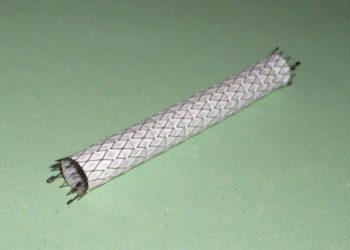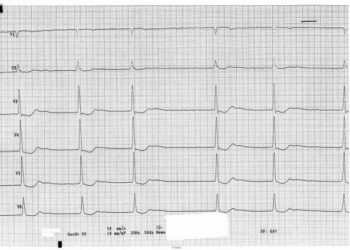Complete revascularization guided by fractional flow reserve not superior to angiography
1. Revascularization guided by fractional flow reserve (FFR) was shown not to have significant benefit compared to angiography for patients with ST segment-elevated myocardial infarction.
2. The wide confidence intervals for the estimate of treatment effect were unable to conclusively interpret the study’s findings.
Evidence Rating Level: 1 (Excellent)
Study Rundown: Percutaneous coronary intervention (PCI) is a common procedure for patients experiencing ST segment-elevated myocardial infarction (STEMI). Complete vascularization of all lesions after the first successful PCI procedure has been demonstrated to reduce the risk for relapse, but the clinical difference between fractional flow reserve (FFR)-guided and angiography-guided is unknown. In a randomized control trial, patients who had received PCI for a STEMI and had multivessel disease underwent complete revascularization of non-culprit lesions either guided by FFR or angiography. The measured primary clinical outcomes were death from any cause, non-fatal myocardial infarction, or hospitalization requiring revascularization within one year. No significant differences were found between the FFR-guided and angiography-guided groups for all three of these measures. Moreover, there were no differences in all secondary outcome measures including procedure complexity, hospitalization outcomes, or improvements in patient functional status. This study’s conclusions were limited by relatively low sample size and large confidence intervals, making it difficult to draw statistically significant conclusions between the datasets. While the differences appear non-significant, further comparative studies are warranted to validate these findings.
Click to read the study in NEJM
Relevant Reading: Complete Revascularization with Multivessel PCI for Myocardial infarction
In-Depth [randomized controlled trial]: In this open-label, multicenter, randomized control trial, 1,163 patients were enrolled in the study. Patients at least 18 years of age who previously underwent PCI to resolve a STEMI and multivessel disease were included in the study. Patients with less than 50% stenosis in a major side branch at least 2.0 millimeters in diameter were excluded from the study. The patients were randomized in a 1:1 ratio to either receive complete revascularization guided by fractional flow reserve (FFR) or by angiography, respectively. The primary outcomes were death from any cause, non-fatal myocardial infarction, or hospitalization requiring revascularization within one year. Patients were followed for up to 36 months at subsequent clinical visits. The data found that there were no significant differences in any of the primary outcomes that were assessed: incidence of death from any cause (hazard ratio, [HR], 0.89; 95% confidence interval [CI], 0.36 to 2.20), non-fatal myocardial infarction (HR, 1.77; 95%CI, 0.82 to 3.84) or unplanned hospitalization requiring urgent revascularization (HR, 1.34; 95%CI, 0.62 to 2.92). The study also found no significant improvements from the FFR-guided group in secondary outcomes of future revascularization, hospitalization, or functional status. Finally, a Kaplan-Meier survival curve analysis found that both procedures had a similar ability to prevent the primary outcomes (P=0.31). The study notes that given the smaller sample size and large confidence intervals, the statistical power may not have been great enough to detect significant differences, and further studies are needed before any conclusions can be drawn. Overall, FFR-guided revascularization did not show significant benefits compared to angiography-guided revascularization.
Image: PD
©2021 2 Minute Medicine, Inc. All rights reserved. No works may be reproduced without expressed written consent from 2 Minute Medicine, Inc. Inquire about licensing here. No article should be construed as medical advice and is not intended as such by the authors or by 2 Minute Medicine, Inc.








